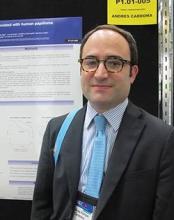SYDNEY, AUSTRALIA – Human papillomavirus was prevalent among lung cancer patients in Latin America, and may be a positive prognostic indicator among individuals also carrying the EGFR and KRAS mutations.
Analysis of data from 84 Hispanic patients with EGFR-positive lung adenocarcinoma, and 48 without the EGFR mutation, showed that 39% were positive for human papillomavirus 16 (HPV-16), according to data presented in a poster at a world conference on lung cancer. Overall, 70% of the patients in the study were never-smokers (93 out of 132 individuals – 58.3% of the EGFR-positive individuals and 91.7% of the EGFR-negative individuals).
Progression-free survival also was significantly greater in patients who were EGFR+/HPV+, compared with those who were EGFR+/HPV– (P = .014), as was overall survival (34 months vs. 24 months; P = .0001).
Overall survival was longer for patients who were HPV positive, even in the absence of EGFR mutations (P = .001). HPV status also influenced overall survival in the cohort of patients positive for the KRAS mutation.
"The presence of viral DNA can thus be presumed to be a positive prognostic factor for EGFR- and KRAS-mutated patients, thereby leading to considering infection as a dominant part of carcinogenesis amongst nonsmokers in Latin America," researchers from the CLICaP (Latin American Consortium for the Investigation of Lung Cancer) reported.
Lead investigator Dr. Andrés Cardona from the Fundación Santa Fe de Bogotá, Colombia, said HPV was known to play a key role in head and neck cancers, and evidence was emerging to support a role in lung cancer, particularly among nonsmokers.
"When you evaluate the perception of the importance of the infection in the patients with lung adenocarcinoma, considering their mutations, EGFR and KRAS, the HPV is an independent predictor of response to tyrosine kinase inhibitors," said Dr. Cardona in an interview.
Human papillomavirus is known to be particularly prevalent in Latin America, as well as in Chinese populations, Dr. Cardona said. The link between HPV and lung adenocarcinoma therefore has implications in terms of future prevention strategies.
"Maybe if this is part of the carcinogenesis of lung cancer in nonsmokers in Latin America as well as China, we can use the vaccine against HPV as a priority for our health system programs to avoid at least a small percentage of lung cancer and head and neck cancers," he said.
The conference was sponsored by the International Association for the Study of Lung Cancer. There were no conflicts of interest declared.


